Big brands need to do more and increase their investment in reusable and refillable systems.

One of my earliest memories as a young child in the Philippines is collecting glass bottles of Coca-Cola from our house during big holiday reunions or family celebrations. Together with my younger sister, we would carry three to five one-liter glass bottles in our small arms and return them to the sari-sari store – our community convenience store – in exchange for a small deposit refund.
I also remember being asked to run errands for my family, and it was my task to get whatever was missing from my grandmother’s recipe for what she was planning to cook that day. I would check our empty canisters from the cabinet and have them refilled in a store nearby. Refilling those bottles was my responsibility, and reusing them brought me pride as a young child.
These are the thoughts that fill my mind whenever I work on global plastic brand audits, picking up plastic sachets, wrappers, and bottles from the dark, polluted beaches and waterways in Manila. I remember, not just for the nostalgia of my youth, but for the memories of witnessing a system that does not rely on throwaway mechanisms. It is a system that works for our community and where a child like me had a place and a role.
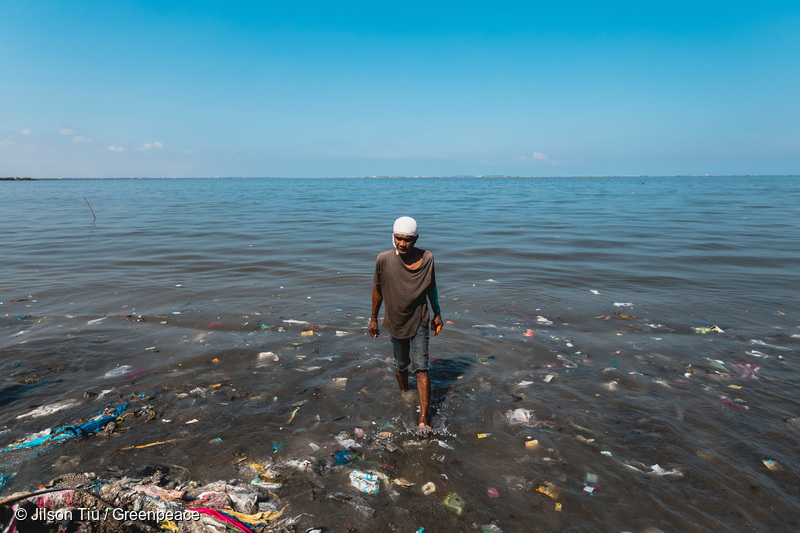
Greenpeace and members of the #breakfreefromplastic movement continue its beach cleanup and brand audit in Freedom Island, Parañaque City.
Its replacement? Cheap, throwaway plastic packaging that pollutes our air, water, land, climate and harms our health from the moment it is created. Recently it has even been detected in our blood. 99% of plastics are made from fossil fuels. Further extraction of fossil fuels means increasing the chances and severity of disasters in an already drastically changing climate.
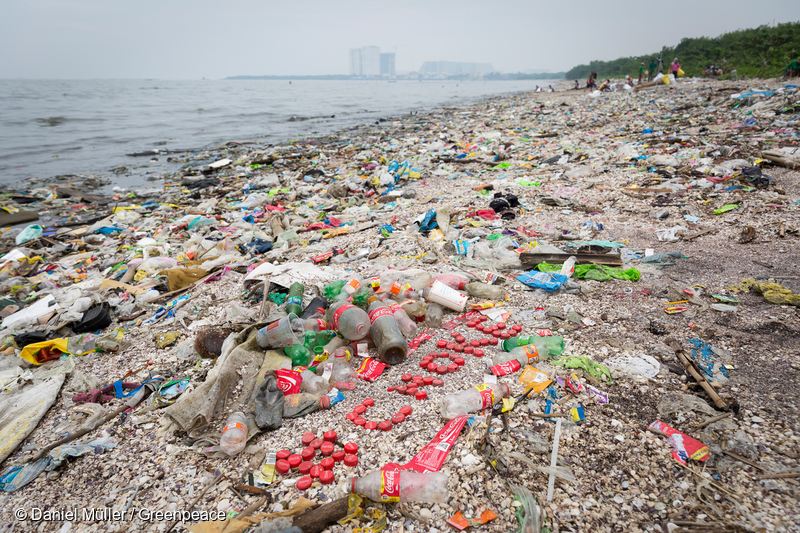
Collection of coca cola bottles and caps found on Freedom Island, Philippines, during a cleanup activity.
Big brands working hand in hand with the fossil fuel industry are flooding us with plastic
Plastic pollution and the effects of its contribution to the climate crisis have become common in many countries. And this is not because people were irresponsible, as big corporations gaslit us into believing, but because they have been producing so much single-use plastic we cannot cope. If big brands like Coca-Cola, PepsiCo, Nestlé and Unilever have their way, plastic production could triple by 2050, which is alarming, especially as we grapple to keep global warming below 1.5 degrees.
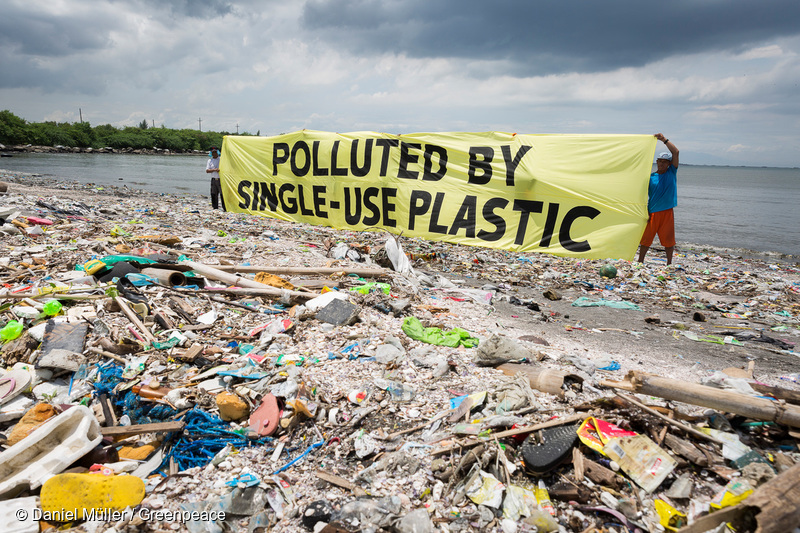
Greenpeace together with the #breakfreefromplastic coalition conduct a beach cleanup activity and brand audit on Freedom Island, Parañaque City, Metro Manila, Philippines.
But thanks to millions of people who are demanding real solutions, the landscape is changing. The recently agreed resolution to negotiate a global plastics treaty is a big step that will keep the pressure on big oil and big brands to reduce their plastic footprint and switch their business models to refill and reuse. Even Coca-Cola, which has been named as the top plastic polluter in global brand audits every single year since 2018, just recently announced that at least 25% of their packaging will be reusable or refillable by 2030.
But this is not enough, and big brands need to do more and increase their investment in reusable and refillable systems. This is the way of the future. If they are true leaders of the industry, they will not hold on to false solutions that do not even make a dent in the monstrous problem they have created and move away from single-use plastic.
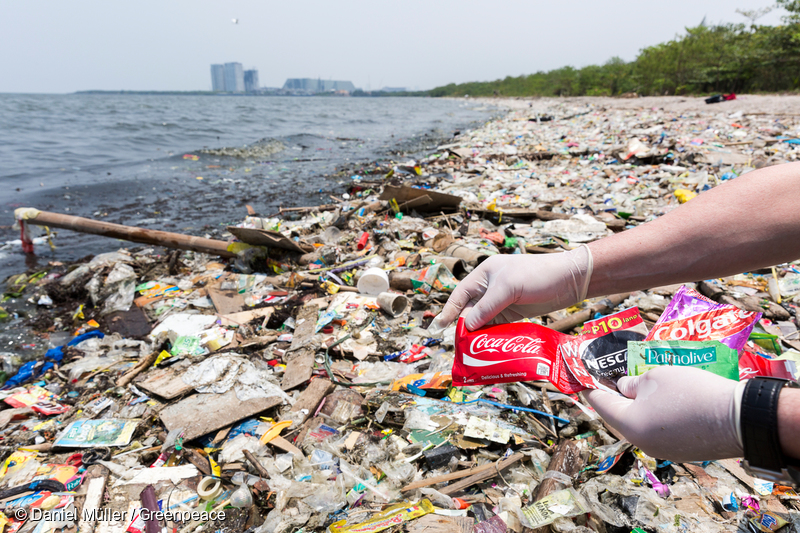
Plastic waste at Manila Bay beaches.
Coca-Cola must double its commitment to 50% reuse and refill by 2030. PepsiCo and Nestlé must catch up and do more by committing to set 50% reusable packaging targets by 2030. These are simple numbers that will make a huge difference to our communities, planet and climate.
As we move to an uncertain future, people will do what needs to be done – to continue to expose, question, and reject the gaslighting, greenwashing, and false solutions that are being waged by big brands. As stakeholders of big brands meet this spring to plot the future of their corporations, they need to seize the moment and make sure that they are on the right side of history – or risk being the brand of plastic pollution for generations to come.
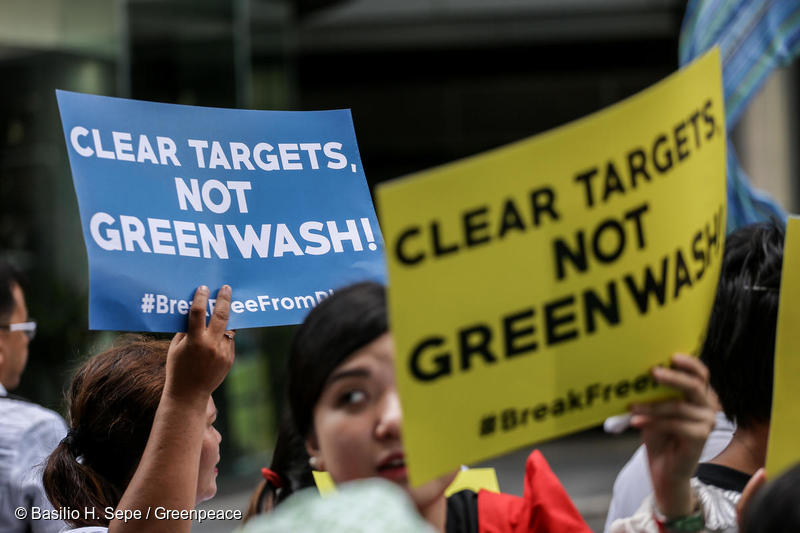
Environmental activists display placards as they troop to Nestle’s Philippine headquarters in Makati City demanding accountability for its role in abetting the country’s plastic pollution crisis.
Things are moving and positive developments are happening, but we will demand more actions and better commitments because we are living in a very critical time for our planet and our climate. We will keep on pushing back because we have a future to win.
Angelica Carballo Pago is the Global Comms and Media Lead for the Plastic-Free Future Campaign at Greenpeace USA.
